DIY Chicken Coop All-Purpose Cleaner
I have found a great DIY chicken coop all-purpose cleaner that is natural and works amazingly well in our coop. The biggest benefit of raising chickens is eggs, so keep them coming all year long by giving them a coop that is fresh and clean.
When you have a homestead, there are certain things that need to be done each month throughout the entire year. Cleaning the chicken coop is one of those things.
If you also live in an area where it snows, you will need to do a full chicken coop clean out each spring and fall.
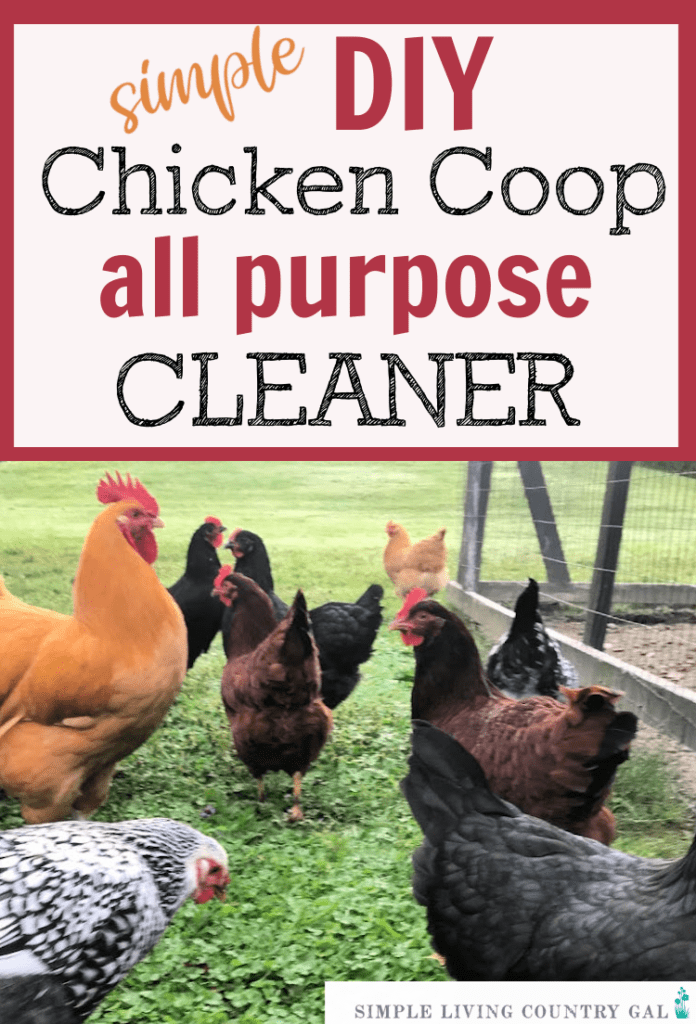
This DIY spray includes the ingredients needed to deter pests that can commonly get into a chicken coop. It also works well as a natural deodorizer that can freshen the smell of the air inside the coop.
If you are brand new to raising chickens and are not quite sure what needs to be done when cleaning out your chicken coop, you can read my article on how to Clean a Chicken Coop Naturally.
There, you will find the steps for cleaning out your coop making this big job an easier one to get done.
When I first started raising chickens, I did not realize how important it was to be proactive with their health. I quickly learned that it is easier to invest extra time to raise healthy and hardy chickens than it is to panic and scramble to treat ill or lackluster ones.
One of the first things I learned was that if you want healthy chickens, you need a clean and healthy environment for them to live in. This is true of any animal….especially chickens.
Chickens tend to mask their symptoms when they are ill or injured. This is a natural instinct, and it is why it is so important to stay on top of things. These three tips are things I have learned over the years and ones I still rely on when raising our own flock.
#1. Hold your hens
Be sure to put your hands on your chickens whenever you are near them. This will help you to become more accustomed to their body condition, allowing you to more easily see when things feel off. Being hands-on will also train your hens to be people friendly, allowing you to treat them more easily if an issue should come up.
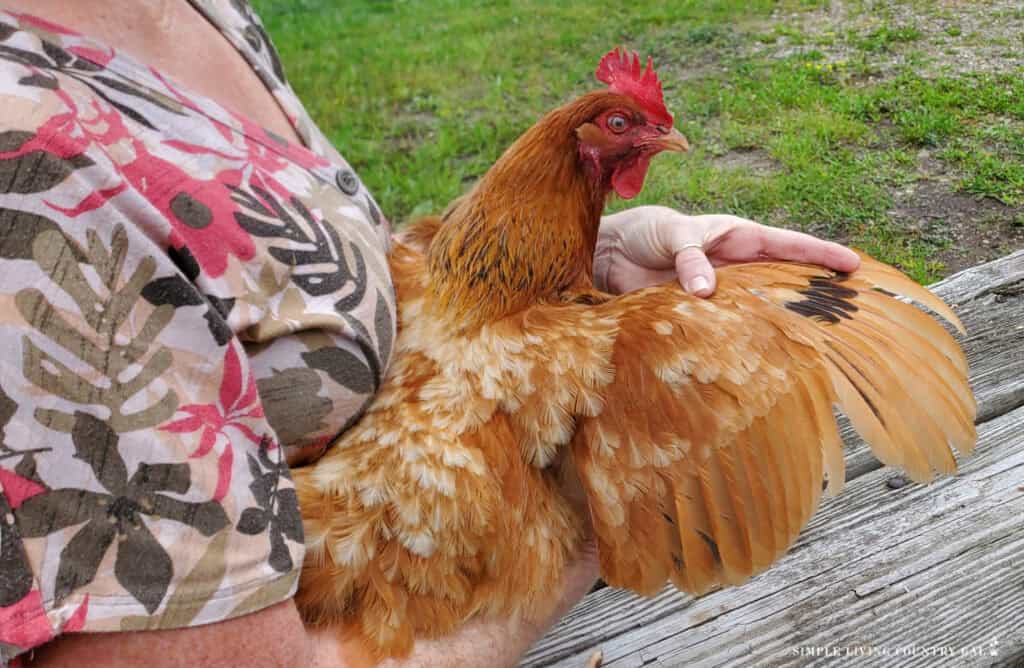
#2. Train your chickens
Train your chickens to come when called. This is helpful when you want the flock to return to the coop or if you see danger and need them back to safety quickly.
How to Train Your Chickens:
- Every time you feed your hens, call them to the food with the same words and voice.
- Shake the feed bowl so they get used to that sound.
- Use words like chick-chick-chick to call them in with a loud voice.
- This will teach them to know that sound means food and to come when they hear it.
Learn How to Train Chickens here.
#3. Give fresh water
Water is crucial to healthy animals. To be sure everyone is drinking, you will want to change out the water daily. Many times animals will ignore water that is dirty or stale, so take the time to freshen it up whenever you feed your flock.
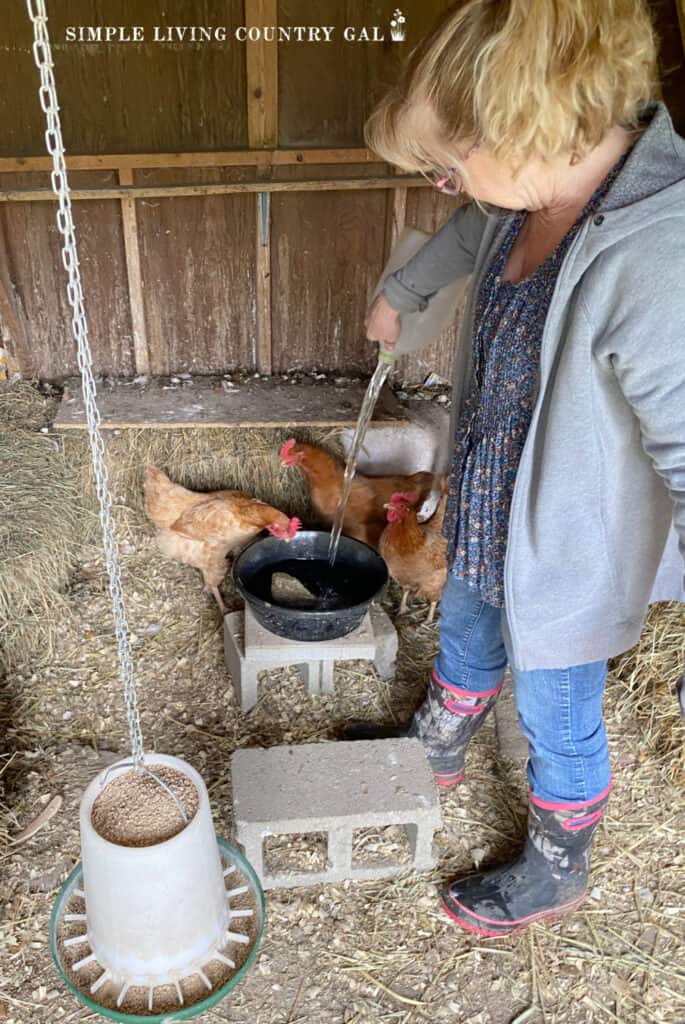
DIY Chicken Coop All-Purpose Cleaner
If you are getting ready to clean your chicken coop, don’t just go in with water and bleach. I have used it before myself, and I have learned that it doesn’t always work as well as we would like.
Not only is it abrasive on your hands but on your nose as well. And if it bothers us, it will also likely bother your chickens.
Be sure to grab the FREE Chicken Coop Recipe + Cleaning Guide Below!
Instead, mix up this easy and natural spray that will clean and disinfect all of the areas inside of your coop.
In this day and age, eating clean foods with as few chemicals as possible is one of the main reasons many of us have a homestead. This is an even better reason to keep any unnecessary chemicals out when you can and help ensure you always have organic foods from egg to table.
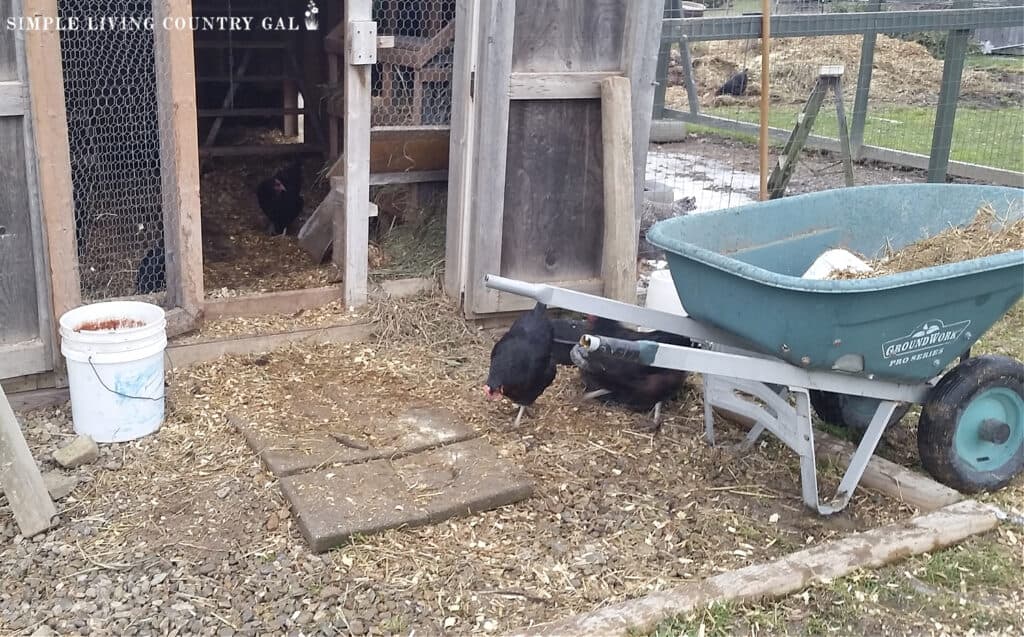
Supplies needed for your DIY coop cleaner:
- White distilled vinegar
- Essential oils
- Mason jar
- White mason jar lids to prevent rusting
- Glass spray bottle (must be glass to keep the integrity of the oil)
Supplies:
- Water
- White distilled vinegar – This is high in acidity and works great to kill bacteria.
- Essential oils – For disinfecting and deodorizing.
- Mason jar – Easy to mix in.
- White mason jar lid – Plastic will help to prevent rusting.
- Glass spray bottle – Use glass to keep the integrity of the oil.
Measurements:
- 2 1/2 cups of water
- 1/2 cup white distilled vinegar
- 20 drops of lemongrass essential oil (parasite repellant)
- 20 drops lavender or peppermint essential oil (helps remove odors)
Step #1. In a quart-sized mason jar, combine water and vinegar.
Step #2. Add the drops of essential oils and mix gently. Remember to mix before every use since water and oil separate naturally.
Step #3. Label your mason jar with DIY all-purpose chicken coop cleaner and seal until needed.
How to use:
To use, pour in the desired amount in the spray bottle as you need it.
Use it to spray the nesting boxes, the walls of the chicken coop, entryways, and even the chicken roost. A light mist each week will ensure you keep up with maintenance cleaning without putting forth too much effort.
Remember to gently mix BEFORE each spray, as the oils tend to separate while sitting.
Make a schedule of your weekly and monthly chores to help ensure you do everything on your maintenance list. Keep that list in your home and on the coop door as a visual reminder of what needs to be done and when.
This extra step will help you to deter disease before it hits, which is, after all, our number one goal as homesteaders.
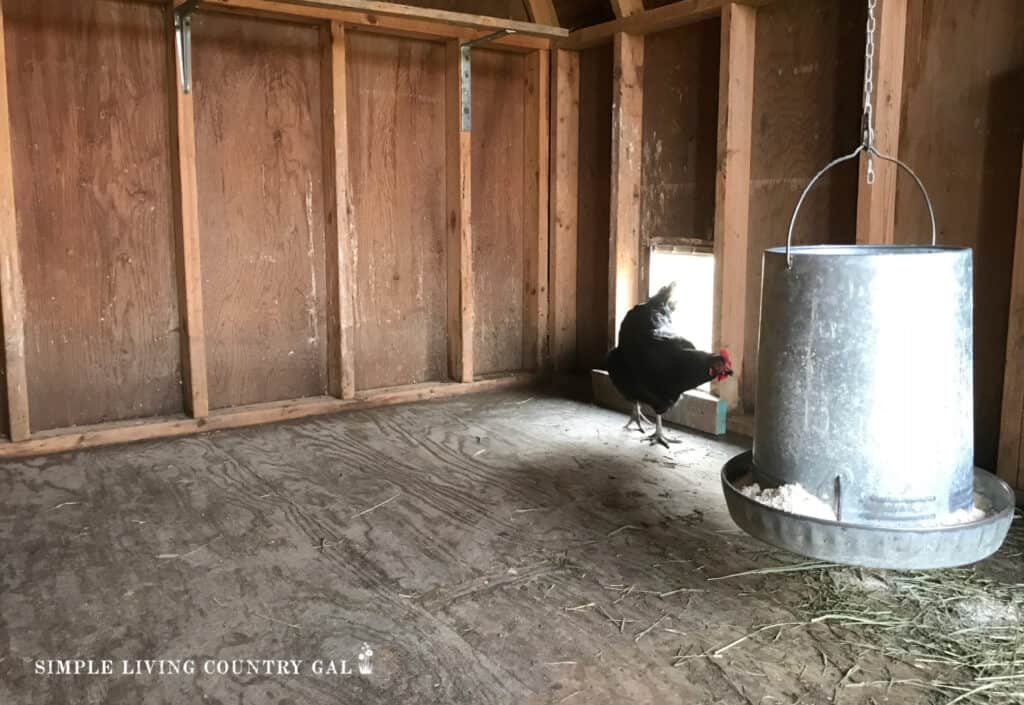
How to Clean Out a Chicken Coop
This is a quick overview for cleaning out your coop. If you want more of an all inclusive guide, you can jump over here and read: How to Clean Out Your Coop Step by Step.
Step 1. Empty Everything Out
Before we can talk about the cleaner, you first will need to clean out your coop. Using a heavy-duty lightweight shovel, remove all the bedding and put it into your compost bin or wheelbarrow.
This part usually takes the longest, so if you can, enlist some help.
Step #2. Wash and dry
If you can, remove the nesting boxes, any dishes, bowls, and feeders. Whatever is not connected to the coop, bring it out and wash it with soap and water, allowing it to dry in the sunshine. The sun is a natural disinfectant and works quite well.
Step #3. Sterilize
Use the DIY cleaner recipe below to ensure you are cleaning and sterilizing each part of your chicken coop without the risk of toxic chemicals.
Remember, our animals depend on us for their care, so it is important to give them the best and most natural home and coop we can. Finally, I know oils are the new buzzword, so do not jump into them lightly. Do your research and commit to making a change for your homestead, your animals, and your family.
Have you tried this DIY chicken coop all-purpose cleaner yet? If so, what did you think?
Setting Up a Chicken Coop Resources:
Chicken Coop All-Purpose Cleaner
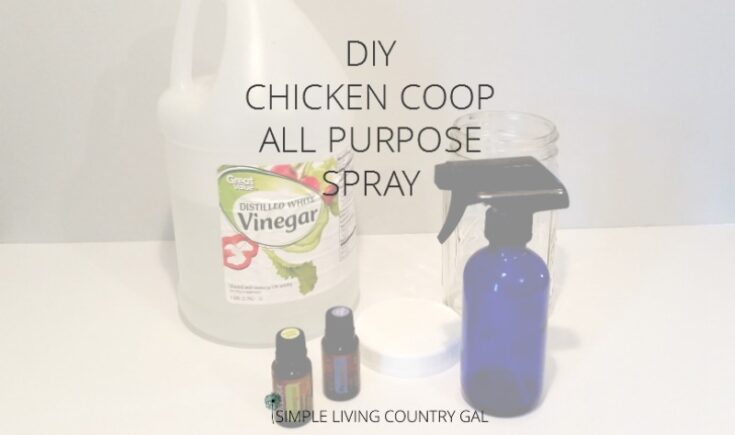
A safe and natural cleaner that works great to clean and sterilize different areas inside of a chicken coop.
Ingredients
- 2 1/2 cups of water
- 1/2 cup white distilled vinegar
- 20 drops of lemongrass essential oil (parasite repellant)
- 20 drops lavender or peppermint essential oil (helps remove odors)
Instructions
- In a quart-sized mason jar, combine water and vinegar.
- Add the drops of essential oils and mix gently. Remember to mix before every use since water and oil separate naturally.
- Label your mason jar with DIY all-purpose chicken coop cleaner and seal until needed.
- Pour the amount I need into my spray bottle as needed.
Notes
Recommended Products
As an Amazon Associate and member of other affiliate programs, I earn from qualifying purchases.
-
Empty Blue Glass Spray Bottles (2 Pack) - BPA Free
-
Cliganic USDA Organic Peppermint Essential Oil, 100% Pure Natural Undiluted, for Aromatherapy | Non-GMO Verified
-
Cliganic USDA Organic Lavender Essential Oil - 100% Pure Natural Undiluted, for Aromatherapy Diffuser | Non-GMO Verified
-
Artizen 30ml Oils - Lemongrass Essential Oil - 1 Fluid Ounce


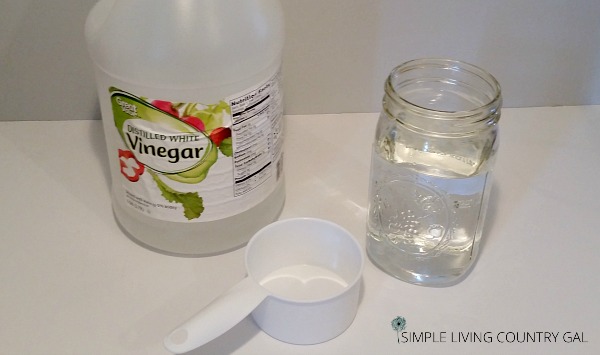
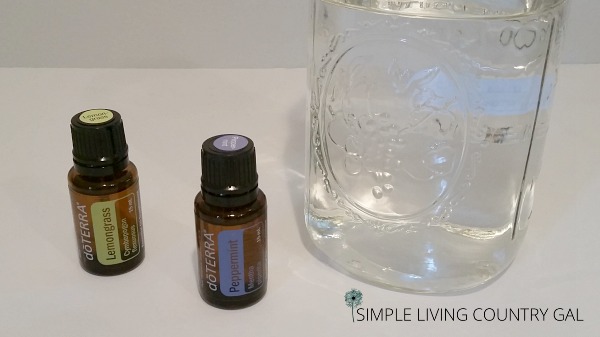
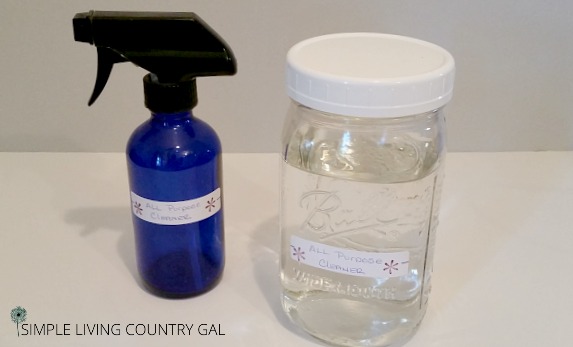




Great article! I am new to chickens …. getting my baby girls this week!! I’ve been doing a lot of research on their care and came across this cleaning solution. Where do you buy your essential oils? Is there a specific brand or type, or is that not important?
Hello, Christine!
I like to use Young Living or and you can find both on Amazon. 🙂
You say lavender in the directions but the picture is peppermint! Which is it?
Oh for heaven’s sake…Lavender is what it’s supposed to be Thank you so much for pointing it out!
Tracy Lyn
Can this also be used for a household cleaner?
Yes, it sure can!
I used 2 1/2 cups water and 1/2 distilled white vinegar and mixed it on a mixing measuring cup. My glass bottle could only hold 2 out of the 3 cups of the mixture. Once in the glass spray bottle I added 20 drops of lemongrass essential oil, 10 drops of lavender essential oil and 10 drops of peppermint essential oil. Swirled it around and used it all in my chicken coop. It smelled delicious and I could see bugs running to get out of the chicken coop lol. It was really strong, but in a good way. It may have been stronger than usual because I didn’t have all 3 cups of the liquid mixture. It was still amazing and I will be using it again!
I am so glad you found it worked well, Sharon! I just love the lemon smell in the coop!
Tracy Lynn
Hello! Do you use this cleaner in place of something like diatomaceous earth or lime powder? Thanks!
No, I still use food grade diatomaceous earth as well. The cleaner is more for wiping down walls, boxes, and roosts.
We have 4 cops and the smell drives me nuts. We change the sawdust shavings often. I wondered if there was a natural cleaner we could use. So I will get the ingredients and try this out.
Thank you!
I used apple cider vinegar. I hope that’s okay. That’s all I had. Can’t wait to try it.
Hello, Linda!
Yes, apple cider vinegar will kill bacteria like white vinegar, I would just watch for flies and ants being attracted to the scent and sweetness.
Something to keep in mind,
Tracy Lynn
Thank you for all of the information. I am so thankful you have done your research. It sure makes it easier being a new chicken owner. I have had chickens about 3 months now. I have had a rough start but as I am learning it is getting better. I lost one of my chickens due to an injury. I don’t know what happened but I doctored it for a bit then I took it to the vet and got pain meds to no avail. i had it put down because it was suffering. It was so sad.
I am so sorry for your loss, Denise.
People think chickens are just small livestock, but for many of us they are pets as well. I hope your flock is doing well now!
Tracy Lynn